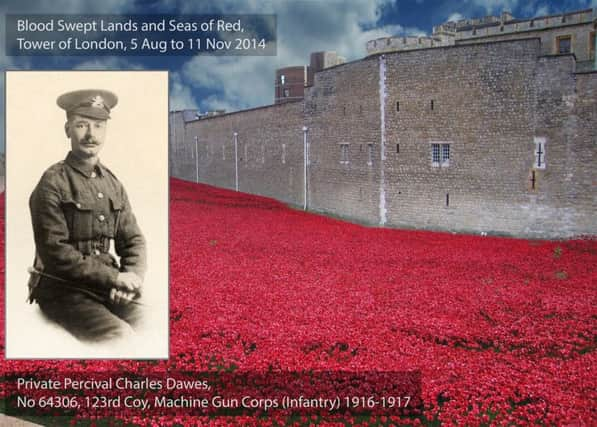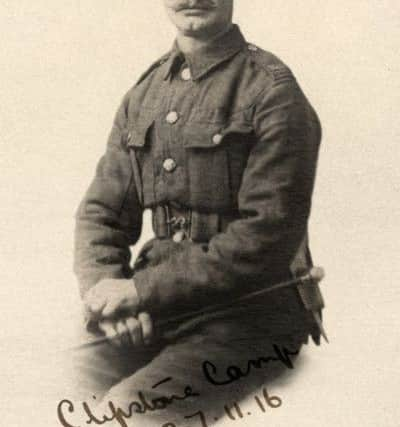Recalling soldier who died 100 years ago this month


“Each of our ancestors has an individual story,” says Pamela, whose maiden name was Stobbs.
“Gathering documents and other facts are part of the process. You can even find a story from a face in a photograph. This is a story about my great grandfather Percival Charles Dawes.”
Advertisement
Hide AdAdvertisement
Hide Ad

Percival was born in 1877, in Kings Lynn, Norfolk. He was the eldest of five, whose parents were Charles Seapy Dawes and Eleanor Shafto, moved to South Shields in the late 1880s.
“In 1902, Percival married a local lass named Maria Cook, at St Thomas Church, in Westoe,” continues Pamela.”They had seven children, four daughters and three sons. Their eldest child, Mabel, was my grandmother.”
Pamela reveals that Percival held down two full-time jobs, working at the post office from 1896 and at St Thomas’ Institute, in Denmark Street, as the caretaker, where he lived with his family.
“In December 1915, Percival enlisted in South Shields in the 4th Battalion Durham Light Infantry (Service No 37502), but was transferred in July 1916 to the Machine Gun Corp (Infantry), Service No 64306.
Advertisement
Hide AdAdvertisement
Hide Ad

“His training was at Clipstone Camp, a few miles from Mansfield in Nottinghamshire.
“As I look at Percival in his army photo, taken at the camp, there is no glint in his eyes, there is no smile, I wonder what was going thought his mind? The photo (a postcard sent to his wife) was taken just before his regiment was dispatched to France.
“Percival’s regiment embarked at Folkestone on February 11, 1917, then disembarked at Boulogne where he was attached to the base depot at Camiers of the 123rd Company. He was killed in action on June 27, 1917, in the France and Flanders Theatre of War, Belgium, at the age of 39.”
The war diary the day before he was killed states that he and his comrades were heavily shelled.
Advertisement
Hide AdAdvertisement
Hide Ad“As I look at the war diary for that day,” adds Pamela, “I note that those killed were described simply as OR (other ranks) and are not named, yet the officers are. I was surprised how rigid social differences were at this time.”
Pamela suspects that her great grandfather died at the hands of a German sniper.
His obituary, published in the Shields Gazette, July 20, 1917, reported that the post office writes of man of “a happy, pleasant and cheerful disposition, he will be much missed on the beat where he spent so many years.”
His lieutenant writes: “It is with deepest regret and heartfelt sympathy that I write to tell you that your husband fell in action on June 27. He was buried by his comrades near the spot where he died. Words are but a poor consolation in the face of such a great sorrow as yours must be, but I would like to say he was universally respected and loved. His unfailing helpfulness, cheerfulness, and good humour at all times endeared him to us all – both officers and men. We have had a cross made with his name inscribed to mark the spot where he lies.”
Percival, who was awarded both the Victory and British medals, died three months before his youngest child, Elizabeth, was born.